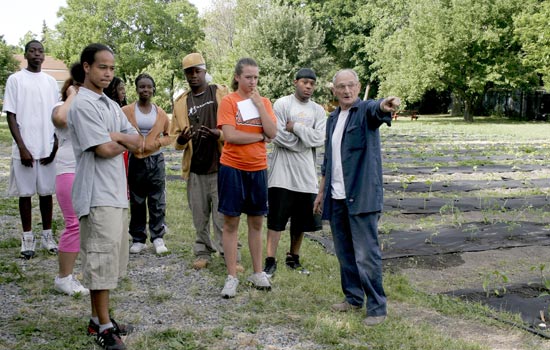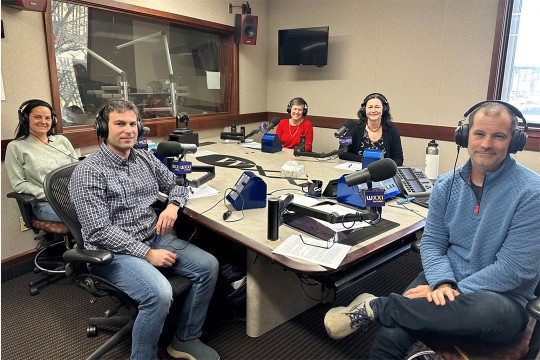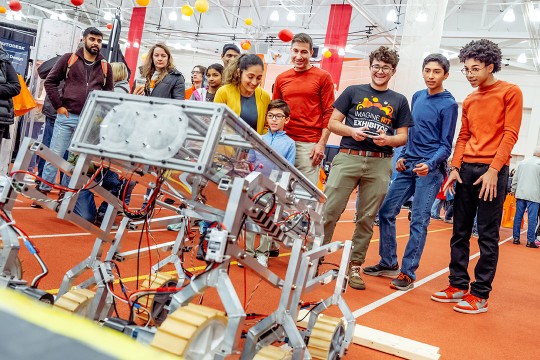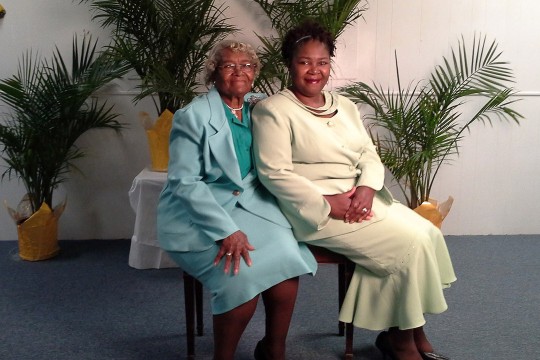RIT students learn the art of being good neighbors
Submitted by Lisa Barker
Volunteer farmer Dick Claycomb leads RIT students and neighborhood youth on a tour of The Vineyard.
A partnership between RIT and the Greater Rochester Urban Bounty, or GRUB, will give seven students a chance to share their expertise with the community and to get something back in return. GRUB is a neighborhood revitalization initiative in northeast Rochester that includes a 2.69-acre farm called The Vineyard and an agricultural educational center. GRUB has become an important part of the seven-year-old partnership between RIT and the NorthEast Neighborhood Alliance.
The Summer Learning Community is a 10-week program that pairs students’ talents with the needs of the Upper Falls and Marketview Heights neighborhoods in northeast Rochester. The learning community, now in its third year, is supported by a Community Outreach Partnership Center grant from the U.S. Department of Housing and Urban Development that will expire in October. “The biggest challenge is to try to coordinate this ever expanding project,” says Ann Howard, NENA-RIT project director and professor of public policy/science, technology and society at RIT.
The Summer Learning Community provides co-op experience and summer employment to RIT students. “We have not had difficulty in recruiting students at all,” Howard says. “They hear about our work and come to us.” Community health is one of the main focuses of this year’s program. The GRUB-RIT program is partnering with the Anthony Jordan Community Health Center to establish community-based participatory research in northeast Rochester. This approach relies upon community partners to interface with neighborhood residents as liaisons for health care providers, and it is part of a national trend toward community-based participatory research. This method of community research is being used to address issues in communities around the world and relies heavily on the active participation of community members from research design, to data gathering and analysis, to action resulting from the analysis.
In response to community concerns regarding healthy eating and nutrition-related conditions such as obesity and diabetes, fourth-year nutrition major Stephanie Reigelsperger is developing community-based material on nutrition education, food choices and preparation. Reigelsperger is interviewing neighborhood residents and youth and documenting the community’s cultural mores about grocery shopping and food preparation, and access to fresh produce. Christine Kray, RIT associate professor of sociology and anthropology, is helping the community-based research and data-collection efforts.
Under Kray’s guidance, Reigelsperger and other students participating in the summer program are compiling stories and recipes from community members for a second edition of the Greater Rochester Urban Bounty’s Garden of Delectable DishesF, first printed by members of PUB, an academic organization within RIT’s School of Print Media. Other RIT students pursuing summer projects through the GRUB-RIT partnership include Lisa Barker, a fourth-year photo-journalism student; Allison Ingalls, a fourth-year international business major; Andrew Pelusky, a fourth-year new media student; Kristen Denninger, a second-year biology/environmental science major; David Clarke, a fourth-year environmental science student; and Katelyn Salvage, a fourth-year interior design major. In addition to their assigned projects, the students are responsible for working four hours a week in The Vineyard.
Project coordinator Meredith Dalton helps keep the learning community running smoothly. She is what Howard calls “the important linchpin between the university and community.” Dalton is the liaison between students and community leaders, and she identifies opportunities for community engagement throughout the year. She and Howard work closely with Shirley Edwards, a community leader and executive director of North East Block Club Alliance, to determine mutually beneficial opportunities. Dalton and Howard also work with RIT faculty who want to incorporate experiential learning into their courses. Built into the course preparation for experiential learning are transportation costs, logistics and the groundwork necessary to ensure a high-quality experience for students and a mutually beneficial experience for the community.
The NENA-RIT partnership initially began in 2000 with a three-year Learn and Serve America grant from the Corporation for National and Community Service. Since then, the collaboration has grown to include Summer Learning Communities, the student-produced quarterly newsletter Beyond the Classroom, the Student Leadership Corps and volunteer activities with the Greater Rochester Urban Bounty.















